What’s in Your Shed? Worcestershire farmer reveals all
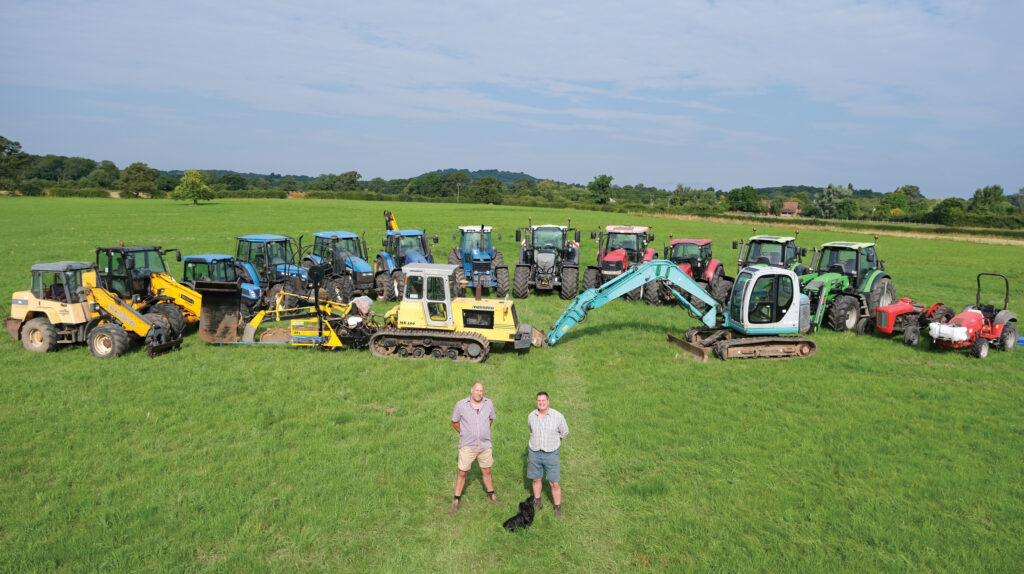 © James Andrews
© James Andrews An eclectic mix of modern and classic kit is proving a reliable ally for Worcestershire farmer and contractor Rob Collins.
See also: Fendt tractors: Common problems and how to fix them
Business facts
- Calf rearing unit with 1,200 head/year throughput
- Cider concentrate production
- Fabrication workshop
- Agricultural contracting, including land drainage, digger work, cultivations, hedgecutting, grain/silage lugging and veg work
- Staff: Rob Collins, Jason Hoskins, Nicky Lambert, Peter Weeks and other casual employees
How did you get started?
I grew up on a mixed farm with my two brothers, but there wasn’t the opportunity for any of us to take this on.
So, we all went our own way, which for me was into the fruit sector. After working as a manager on a local dessert fruit farm I decided to set up my own specialist contracting outfit in 1999.
I had no kit and very little money, so I started small with a 25hp John Deere compact tractor and an apple harvester.
Cider fruit was the main focus and the business grew steadily, to the point that there were 28 tractors and assorted machinery harvesting 17,800t a year.
We were also designing and making our own equipment and I sat on two grower groups.
It was an intense job and after more than 20 years at it, I fancied a change.
My wife, Hannah, and I had already set up our own calf rearing business, so I let someone else take on the cider apple job and turned my attention to that, as well as some general contracting work and fabrication.
My right-hand man Jason Hoskins also came with me and he spends most of his time in the workshop, making and mending equipment either for us or other farmers.
We’re always striving to make jobs as efficient as possible, so we’ve put a lot of time and investment into the infrastructure and staff working in the calf unit, the theory being that if you make a job easy it gets done properly.
Another new venture is a two-year project working with Innovate UK looking at using Biochar to help make fruit production net zero.
How brand loyal are you?
I’ve always tended to buy machinery based on value for money and how good the backup is.
You can’t fault our local dealer Pallisers on that front, which is why I almost exclusively ran small Deutz tractors in the fruit business.
Things are a little different these days, as the prices are high and it doesn’t make economic sense to buy new.
This means I’ve now got a mix of different brands and ages of machinery. However, all have a decent reputation for reliability and we can either fix them ourselves, or I know of someone locally who can look after them for us.
Ford and New Holland feature fairly heavily, as these are the tractors I grew up driving and have a decent understanding of mechanically.
But I’ve also got a Fendt , a pair of Deutz Agrotrons, a couple of Cases and a few classics.
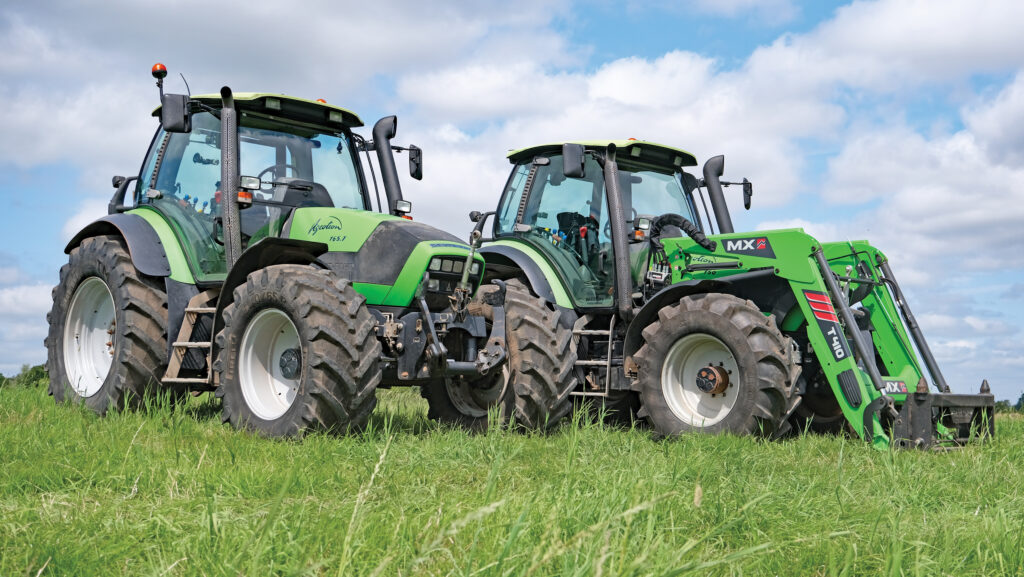
The Deutz Fahr Agrotron 165.7 and 150.6 © James Andrews
Favourite dealer?
Definitely Pallisers of Hereford. I’ve bought a lot of tractors off them over the years and the service has always been superb.
Favourite piece of kit?
For me, it’s the AFT100 trencher. This is partly because it’s such a good machine, but also because I grew up around drainage work and enjoy the challenge of getting it right.
Back in the day, the family had an old Fowler steam ploughing engine that was used to winch a trencher through the ground.
This had been modernised, with a conversion to lay plastic pipe, and had a hopper for applying gravel, but it was obviously an involved process.
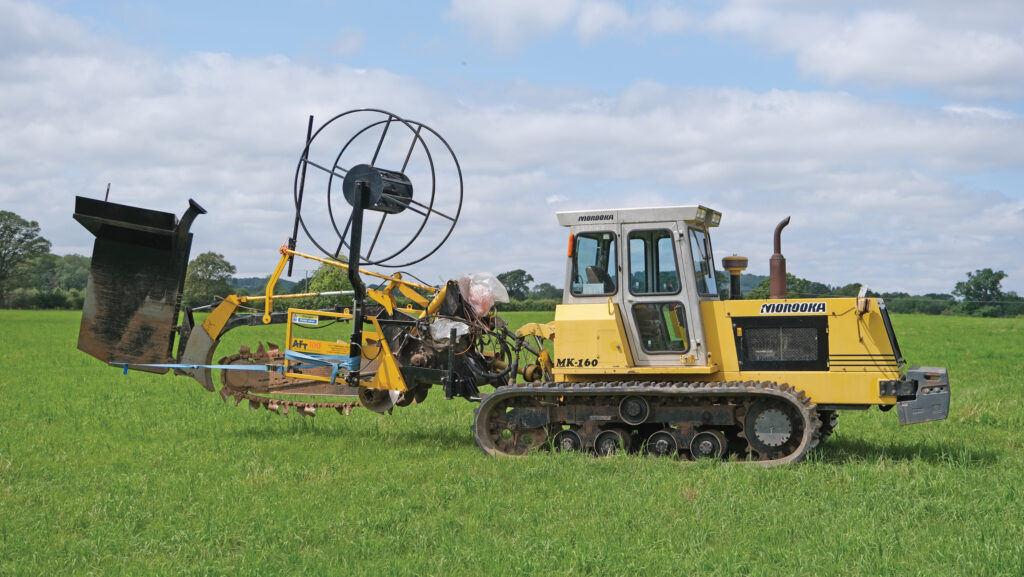
AFT100 trencher and Morooka crawler © James Andrews
The AFT100 is a world away from that. It does require a bit of brain power to get it set up correctly, but once you’re up and running it’s simple to operate.
We’ve had it six years now and it’s been kept busy replacing damaged or blocked sections of pipe and fixing problems with existing schemes.
For added traction in wet winter conditions we pull it with a Morooka MK160 crawler, which can float over ground you can barely walk on. Its Iveco engine also sounds lovely.
Least favourite piece of kit?
Any buck rake. Not because they’re bad pieces of machinery but I’ve always hated the job.
As soon as you’ve got the clamp looking nice some bugger dumps another load of grass and you’ve got to start all over again.
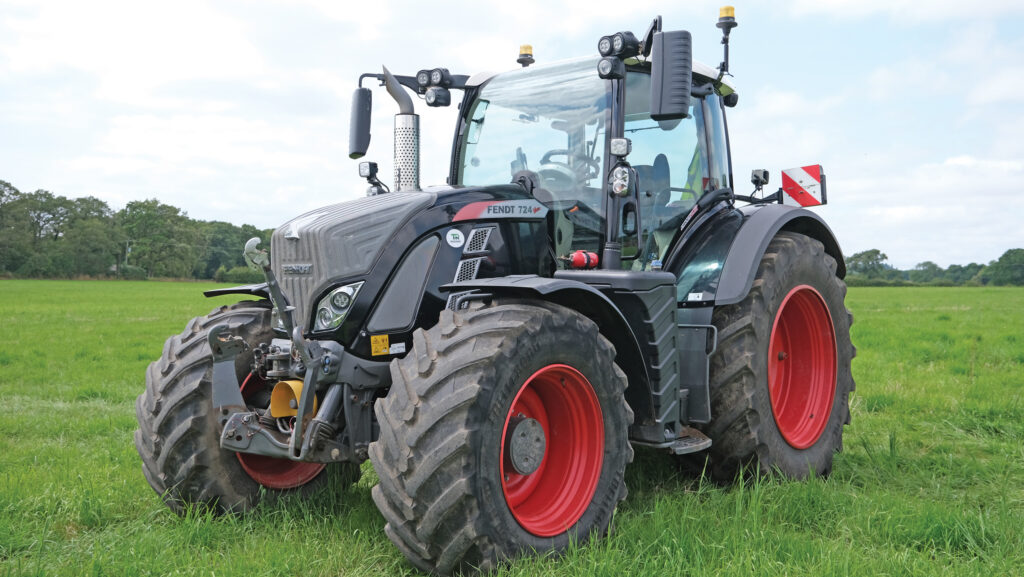
Fendt 724 © James Andrews
Latest purchase?
A second-hand Fendt 724 Black Edition. I think they’re fantastic tractors – powerful for their size, reliable, hold their value – and I knew I had a mechanic who could look after it for me.
I’m far more concerned by condition than the amount of work a tractor has done, which is why I was happy to buy it with 8,000 hours on the clock.
I’ve put another 1,000 on it since and I really enjoy driving it.
My only complaints are that the automatic seat needs adjusting every time I sit on it and the ride isn’t quite as smooth as I’d like.
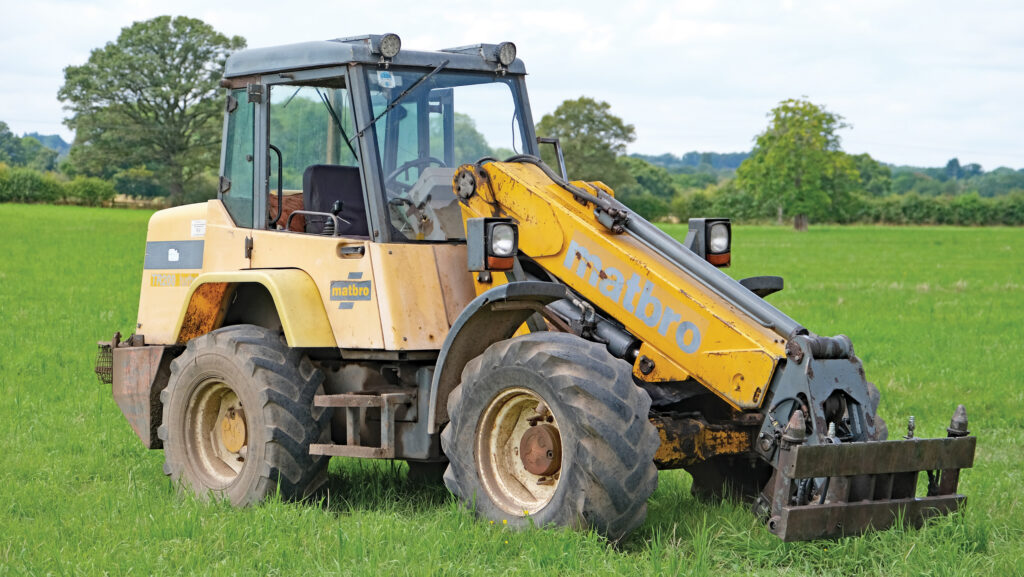
The Matbro TR200 is on 13,880 hours © James Andrews
Oldest machine still at work?
Back in 2005, I desperately needed a telehandler for loading apples, but didn’t have the money to buy anything decent.
All I could afford was a rough Matbro TR200 on 9,000 hours which I picked up at a farm sale in Malvern for £6,000 and then boiled on the way home because the radiator was clogged with crud.
But we cleaned it up, replaced the pivot pin, gave it a proper service and it’s never let us down since. It’s had a hard life with us too, loading fruit with a 1t bucket while the boom is at full extension and running around on dual wheels pushing out prunings.
It’s now on 13,880 hours and still gets used regularly for mucking out the calf pens.
How long do you keep your machines?
When I had the cider fruit business I used to run two sets of tractors: one group that would be replaced every five years when the clocks were on 3,500 to 5,000 hours, and another that almost never got changed.
Now I’m entirely in the latter category and have no plans to sell any in the foreseeable future. Many of the older tractors seem to be going up in value, so I’m hoping they’ll be a sound investment.
One of the latest classics to arrive is a Muir Hill 141. The engine had been rebuilt before I got it but it’s still a bit of a dog, particularly in the backend where the pto had been removed and there have been some botched repairs.
We’re in the process of rebuilding it and it’ll be as good as new when we’ve finished.
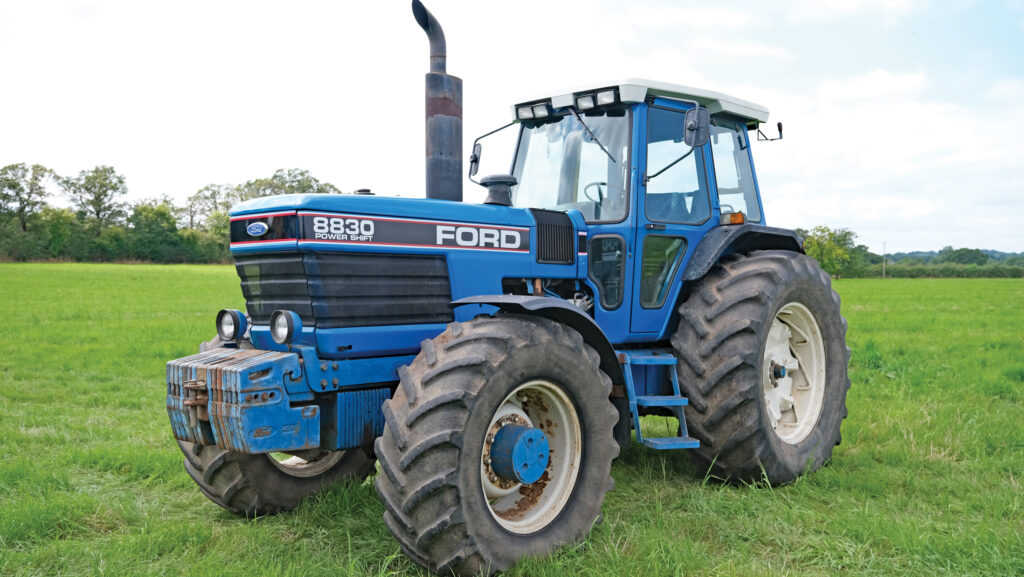
Ford 8830 © James Andrews
What’s next on your wish list?
When I was 13, I worked for a neighbour driving trailers alongside the combine and the two tractors I got to drive were a Ford 8210 and a 7000.
I loved them both, but the 7000 was the one I looked forward to getting in and I’ve hankered after one ever since.
Biggest machinery mistake?
When I was younger, I learned an important lesson while towing a Russell 56-bale squeeze behind a Ford 5000.
They were notoriously unstable, but with a short drawbar on the tractor I was merrily running back and forth from the field without any problems.
However, when I swapped to a different tractor with a long drawbar the handling became a little unpredictable. So much so that I managed to tip it over in someone’s gateway.
With a bit of help I managed to release the bales, get it on its wheels and head back to the yard to get it repaired.
All we had to do then was recover the bales. But in the meantime, someone had flicked a fag out of the window and the whole lot was ablaze.
I still remember my dad cursing me as we were lobbing buckets of water to put it out.
Most expensive repair bill?
I used to have a Deutz-Fahr 5100 on an apple harvester and it snapped in half as the casting wasn’t strong enough – earlier 410s were far tougher machines. The total bill to put it right was about £16,000.
I also had a £600 bill from the local JCB dealer for trying and failing to diagnose a problem with the boom suspension on the TM300. All that was required was a £10 switch.
Best invention?
After a trip to the Netherlands, where I saw reciprocating knives being used to prune dessert apple trees, I decided to build a machine that would work for cider fruit.
Everyone was hand pruning at the time, so this massively speeded up the process and significantly improved profits.
The pruner was designed to fit on a tractor’s front linkage and had two independently adjustable double knives that could be manipulated to cut and shape the trees.
We also made a cleaner that would take all grit, leaves and other detritus from apples in a single operation.
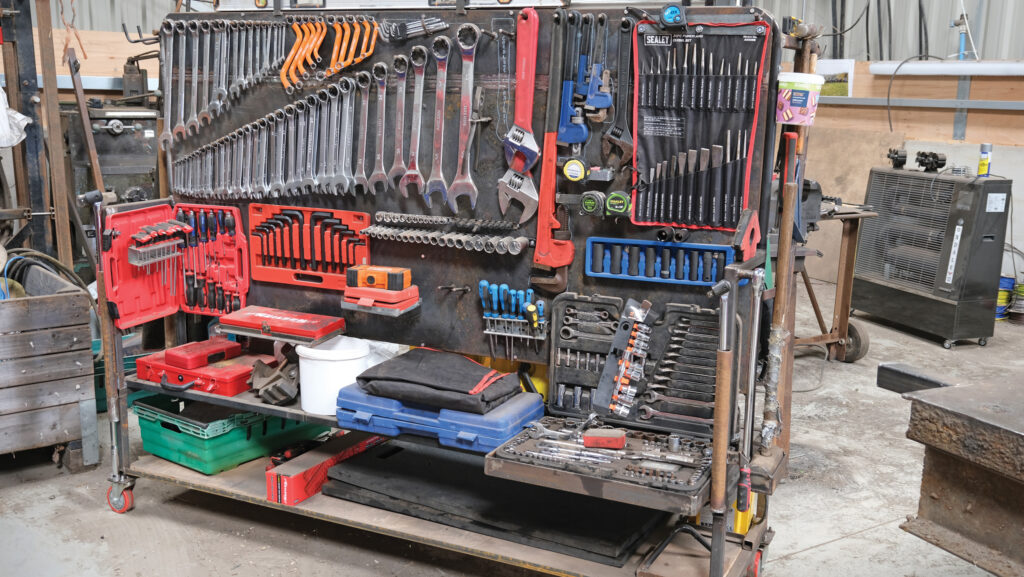
The farm-build tool rack © James Andrews
What couldn’t you live without in the workshop?
Jason built a wheeled tool station that has transformed workshop jobs. It took him about two weeks to put it together, but it must have already saved more man hours than that.
Every item has its place, be it a spanner, socket set or angle grinder, so we’re no longer wasting time hunting around for tools.
The fact that we’ve got smooth concrete in the workshop also means you can easily roll it to the project you’re working on.
What’s your everyday transport?
The main runaround is a Land Rover Discovery 4 Commercial that I bought on 25,000 miles and it’s still going strong 115,000 miles later.
I’m well aware of the problems these trucks can give, but I think part of the reason ours has been so good is that the oil gets changed every 7,000 miles, which is 3,000 earlier than Land Rover advises.
We’ve also got an Isuzu D-Max 2.5-litre pickup which has always been gutless. It has started to go a bit better now it’s got to 80,000 miles, but it’s still nothing special.
It was cheap at the time, though, and it hasn’t cost us much to keep it running.
Best tractor you’ve ever had?
It’s impossible to pick between the Deutz 150.6 and 165.7, which are both fantastic tractors.
They were also good value for money when I bought them seven years ago. The 150.6 cost me £22,000 when it was on just 5,500 hours and the only significant part I’ve replaced is a set of front tyres.
I also treated it to a front linkage and pto, and an MX410 loader with electronic joystick control, all of which add to its usefulness.
The 165.7 is just as good, with its bigger engine and extra power coming in handy for more demanding jobs. This cost me £25,000 when it was on 3,500 hours and has been just as reliable.
The worst?
A few years ago I bought a New Holland TM165 off a local contractor who I knew looked after his kit well.
But as soon as it arrived weird things started to happen, such as oil leaking into the bell housing and clutch packs failing.
We seemed to be constantly splitting it to sort problems and it must have cost about £10,000 in repairs over the 18 months we had it, despite doing a lot of the work ourselves.
It was soon shifted on and I expect it never skipped a beat for the next owner.
Most useful piece of technology?
There’s lots of technology I find useful on the Fendt, but my favourite is the fact that it’s so easy to store settings for different implements.
It saves so much time not having to set the machine up manually every time you hook it up.
And the most pointless?
There’s a lever next to the hand throttle on the Case Puma CVX that’s designed to improve fuel economy.
I’ve wasted a lot of time playing around with it and trying to work out the effects but have now given up and just run it in the full power setting all the time.
Biggest machinery bargain?
For the sheer amount of work it’s done relative to the cost I paid, it has to be the Matbro TR200. That said, most of the older tractors are now worth more than I spent on them.
Biggest bugbear?
I think the shuttle lever on New Holland and Case IH tractors is dangerous as it returns to centre and you can’t see at a glance if you’re in forwards or reverse.
It’s also ridiculous that you have to press a button to put it into neutral – why not have the middle position as neutral, up as forwards and down as reverse, like most other brands do?
In the shed
Tractors Fendt 724, Case IH Puma 200 CVX, Farmall U115 Pro and 4230, Deutz-Fahr 165.7 and 150.6, New Holland TS115 x2, T4050 F and 7840, Morooka MK160, Ford 8830, Muir Hill 141, McCormick GX40H, Massey Ferguson 35 and Same Antares 100
Telehanders JCB TM300, Matbro TR200
Digger Kobelco 80MSR 8.5t
Trailers Broughan 20t apple/silage/grain trailer, 37cu m Brantner silage/grain trailer, Herbst 15 dump trailer and gravel cart
Other kit Kuhn 3m trailed mower-conditioner, Lely six-rotor tedder, Spaldings Flatlift, Kverneland five-furrow auto-reset plough, McConnel PA65T hedgecutter

